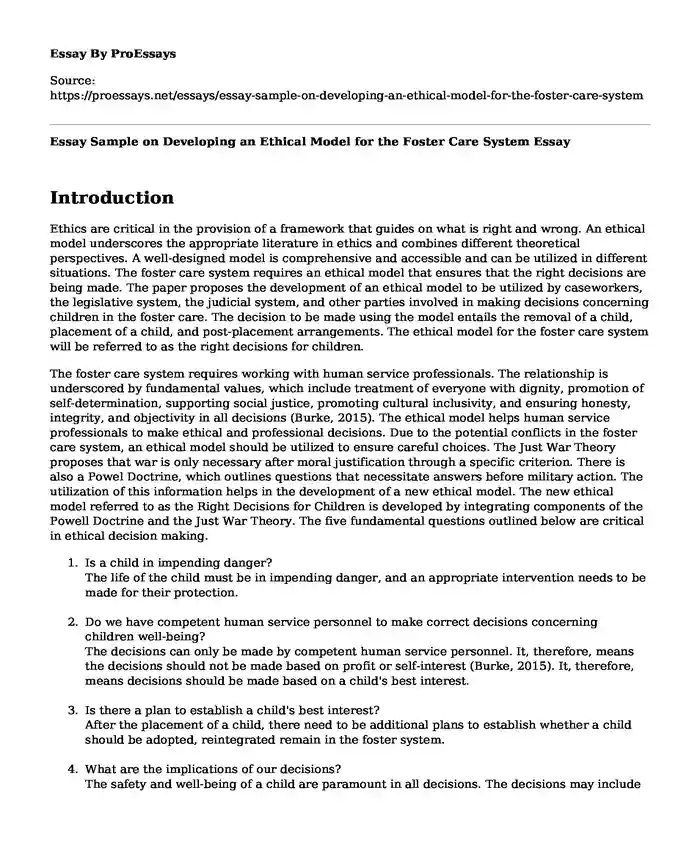Introduction
Ethics are critical in the provision of a framework that guides on what is right and wrong. An ethical model underscores the appropriate literature in ethics and combines different theoretical perspectives. A well-designed model is comprehensive and accessible and can be utilized in different situations. The foster care system requires an ethical model that ensures that the right decisions are being made. The paper proposes the development of an ethical model to be utilized by caseworkers, the legislative system, the judicial system, and other parties involved in making decisions concerning children in the foster care. The decision to be made using the model entails the removal of a child, placement of a child, and post-placement arrangements. The ethical model for the foster care system will be referred to as the right decisions for children.
The foster care system requires working with human service professionals. The relationship is underscored by fundamental values, which include treatment of everyone with dignity, promotion of self-determination, supporting social justice, promoting cultural inclusivity, and ensuring honesty, integrity, and objectivity in all decisions (Burke, 2015). The ethical model helps human service professionals to make ethical and professional decisions. Due to the potential conflicts in the foster care system, an ethical model should be utilized to ensure careful choices. The Just War Theory proposes that war is only necessary after moral justification through a specific criterion. There is also a Powel Doctrine, which outlines questions that necessitate answers before military action. The utilization of this information helps in the development of a new ethical model. The new ethical model referred to as the Right Decisions for Children is developed by integrating components of the Powell Doctrine and the Just War Theory. The five fundamental questions outlined below are critical in ethical decision making.
- Is a child in impending danger?
The life of the child must be in impending danger, and an appropriate intervention needs to be made for their protection.
- Do we have competent human service personnel to make correct decisions concerning children well-being?
The decisions can only be made by competent human service personnel. It, therefore, means the decisions should not be made based on profit or self-interest (Burke, 2015). It, therefore, means decisions should be made based on a child's best interest.
- Is there a plan to establish a child's best interest?
After the placement of a child, there need to be additional plans to establish whether a child should be adopted, reintegrated remain in the foster system.
- What are the implications of our decisions?
The safety and well-being of a child are paramount in all decisions. The decisions may include forceful removal of a child from their home or establishment of the safest place for them to live.
- What is the child's likelihood of success?
The likelihood of success for various decisions must be considered. These entail whether the child should be reintegrated with their family, or placed for adoption (Clement, 2020). It means the probability of success of every decision must be examined.
Conclusion
In conclusion, the development of the ethical model for the foster care system is critical for making appropriate decisions that uphold the maximum safety and well-being of children in the system. The above-outlined questions are essential for human services in the foster care system. It provides a rational model that upholds a child's safety and well-being.
References
Clements , I. (2020). Foster Parent Code of Ethics. The National Foster Parent Association - Foster Parent Code of Ethics. https://nfpaonline.org/Ethics.
Burke, A. (2015). Ethical Standards for HS Professionals. https://www.nationalhumanservices.org/ethical-standards-for-hs-professionals.
Cite this page
Essay Sample on Developing an Ethical Model for the Foster Care System. (2023, Sep 17). Retrieved from https://proessays.net/essays/essay-sample-on-developing-an-ethical-model-for-the-foster-care-system
If you are the original author of this essay and no longer wish to have it published on the ProEssays website, please click below to request its removal:
- Discrimination, Performance Management, Performance Appraisal, Affirmative Action and Employment
- Union Discriminates Female Police Inspector, Chief Massey Alerts Colleagues - Essay Sample
- Racism: Divisive Fallacies of Social Inequality - Essay Sample
- Paper Example on Panic Attacks: A College Student's Reality
- Paper Example on Empowering Student Learning: Redefining Education in a Technology-driven World
- Free Paper on Desire in Philosophy: Enhancing Cognition & Action Dispositions
- Ethical Challenges for Anthropological Research - Free Essay Example







